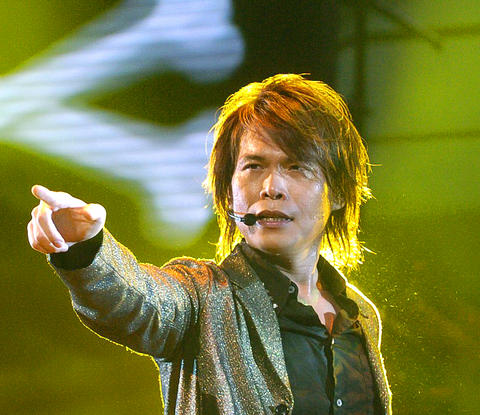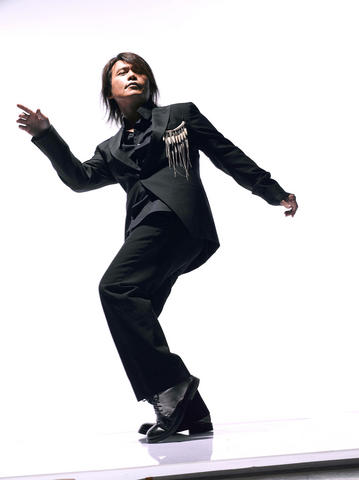Wu Bai (伍佰) and China Blue, who made live, guitar-oriented rock 'n' roll popular in Taiwan, kick off a four-city tour starting at the end of this month and tickets are expected to sell out quickly. Labeled "the king of live music," Wu Bai is one of the biggest pop music stars in East and Southeast Asia, though he has also maintained a measure of local street credibility as the epitome of taike (台客) chic. Once a derogative appellation used to refer to someone with a low-class attitude or style, taike has now been subverted and has gained street credibility
With his distinctive helmet hair, powerful blues-oriented chords and lyrics in Hoklo and Mandarin, Wu Bai emerged in the mid-1990s as the figurehead of Taiwanese rock 'n' roll, packing stadiums with crowds of up to 100,000 and generating record sales of more than 600,000 copies for his most popular albums. Along with May Day (五月天) and Back Quarter (四分衛), Wu Bai and his band - bassist Ju Jian-hui (朱劍輝), drummer Dean "Dino" Zavolta and keyboard player Yu Dai-ho (余大豪) - are one of the few big-time local acts with garage-band roots.
At 39, Wu Bai, whose monikers include the "cult master" and the "king of Chinese rock," has released a dozen studio albums with China Blue. He's also acted in four movies and served as a spokesman for Taiwan Beer. "I pursue light and heat. I like this kind of beautiful lavish life. So I push myself, burn myself, and see how far I can go," he wrote in his biography/photo album retrospective Moonlight Symphony (月光交響曲).

With his Taiwanese-accented Mandarin and rock star looks, Wu Bai, whose real name is Wu Chun-lin (吳俊霖), projects the image of the archetypical taike. Since the first TK Rock concert (台客搖滾嘉年華) in 2005, he has enjoyed new popularity as Taiwanese who are proud of their heritage embrace elements of the country's working-class culture.
Wu Bai and China Blue have a uniquely Taiwanese take on rock 'n' roll, with influences like puppet theater (布袋戲) and old TV variety shows. Zavolta said they favor "more of an Asian pop rock 'n' roll style" that combines power chords with groovy bubble gum pop. "We try to stay on the cutting edge musically and try to keep it real, but still have a certain sound," he said. China Blue was formed in 1991 by Zavolta and Ju, who soon met a then-pudgy young guitarist named Wu Bai. They got their first big break in 1992, when they wrote two songs for a movie soundtrack. Their most popular album, 1996's The End of Love (愛情的盡頭), has sold more than 600,000 copies.
Fans can expect some new material mixed with old hits at the band's upcoming concerts, Zavolta said, but a new album is currently not in the works. "I don't know what we're coming up with next," he said. "I don't know what Wu Bai has up his sleeve."




On April 26, The Lancet published a letter from two doctors at Taichung-based China Medical University Hospital (CMUH) warning that “Taiwan’s Health Care System is on the Brink of Collapse.” The authors said that “Years of policy inaction and mismanagement of resources have led to the National Health Insurance system operating under unsustainable conditions.” The pushback was immediate. Errors in the paper were quickly identified and publicized, to discredit the authors (the hospital apologized). CNA reported that CMUH said the letter described Taiwan in 2021 as having 62 nurses per 10,000 people, when the correct number was 78 nurses per 10,000

As we live longer, our risk of cognitive impairment is increasing. How can we delay the onset of symptoms? Do we have to give up every indulgence or can small changes make a difference? We asked neurologists for tips on how to keep our brains healthy for life. TAKE CARE OF YOUR HEALTH “All of the sensible things that apply to bodily health apply to brain health,” says Suzanne O’Sullivan, a consultant in neurology at the National Hospital for Neurology and Neurosurgery in London, and the author of The Age of Diagnosis. “When you’re 20, you can get away with absolute

May 5 to May 11 What started out as friction between Taiwanese students at Taichung First High School and a Japanese head cook escalated dramatically over the first two weeks of May 1927. It began on April 30 when the cook’s wife knew that lotus starch used in that night’s dinner had rat feces in it, but failed to inform staff until the meal was already prepared. The students believed that her silence was intentional, and filed a complaint. The school’s Japanese administrators sided with the cook’s family, dismissing the students as troublemakers and clamping down on their freedoms — with

As Donald Trump’s executive order in March led to the shuttering of Voice of America (VOA) — the global broadcaster whose roots date back to the fight against Nazi propaganda — he quickly attracted support from figures not used to aligning themselves with any US administration. Trump had ordered the US Agency for Global Media, the federal agency that funds VOA and other groups promoting independent journalism overseas, to be “eliminated to the maximum extent consistent with applicable law.” The decision suddenly halted programming in 49 languages to more than 425 million people. In Moscow, Margarita Simonyan, the hardline editor-in-chief of the